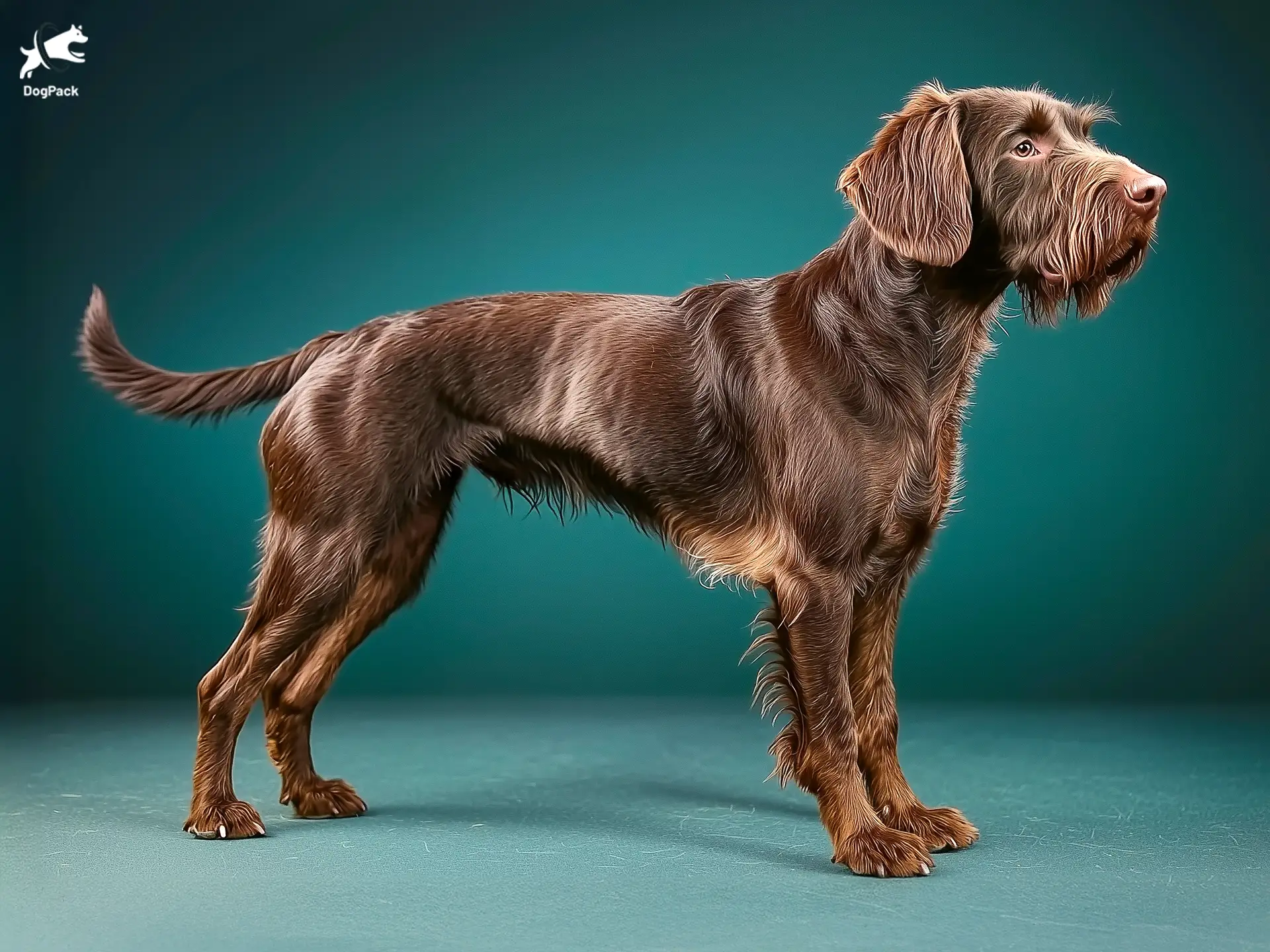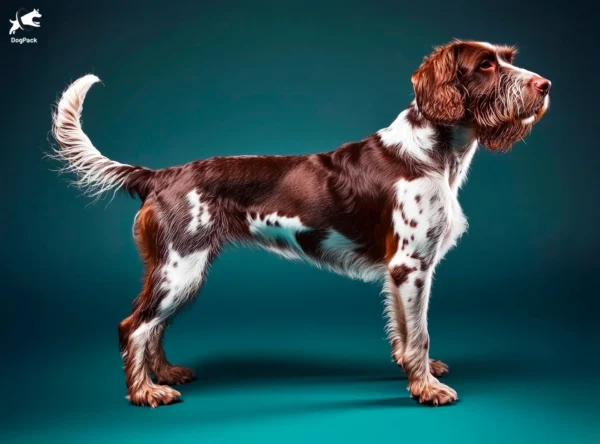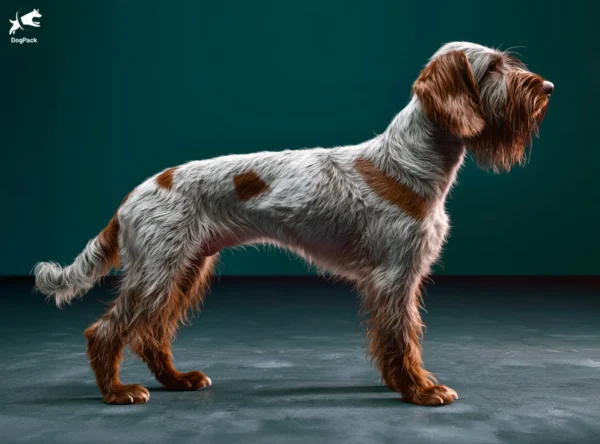Pudelpointer Dog Breed Info & Overview
The Pudelpointer is a rare and highly valued hunting companion known for its intelligence, athleticism, and trainable nature. This versatile gun dog excels in both water and field, making it a prized favorite among experienced outdoors enthusiasts. Adventurous owners love its eager spirit, while families appreciate its loyal temperament and gentle disposition.
Characteristics
Pictures
Breed History
Born in the late 19th century, this remarkable breed emerged from crossing water-loving Poodles with agile English Pointers. The goal was to craft a skilled gun dog adept in both pointing and retrieving. Over time, careful breeding honed a dependable hunting partner that excelled on land and in water. Many credit German breeder Baron von Zedlitz for championing this versatile canine’s development.
As hunting demands evolved, the Pudelpointer proved itself invaluable, handling everything from marsh birds to upland game with ease. Early breeders prioritized working ability over appearance, ensuring a consistently high-performance dog. German sportsmen were quick to adopt this breed for its unwavering stamina, strong prey drive, and robust constitution—traits that remain key selling points for owners today.
Though it started with a small gene pool, the breed’s strict standards preserved desirable qualities and minimized health issues. Hunting clubs worldwide took notice, welcoming these dogs into performance trials and field tests. Even now, they are relatively rare outside dedicated sporting circles. However, for those seeking a hard-working companion with deep historical roots, this focused and versatile breed remains a top choice.
Temperament, Personality
Friendly and self-assured, this breed warms up quickly to those who match its lively energy. Despite having strong hunting instincts, it’s known to be affectionate and gentle around loved ones. Early socialization helps channel that robust drive, ensuring a balanced pet that can transition between long hunts and cozy family nights. A Pudelpointer craves positive reinforcement and plenty of mental stimulation.
While typically even-tempered, they can be reserved with strangers until trust is established. Their sharp senses keep them vigilant, which can make them quick to alert you of unfamiliar happenings. Confidence helps them navigate new environments with minimal stress. Pair that with a playful spirit, and you get a dog that bonds deeply and thrives when included in family activities or outdoor adventures.
Their sociable side shines when they’re around children and other pets, though supervision and proper introductions are always recommended. Thanks to an inherent desire to please, training them to behave politely in a household setting usually goes smoothly. Occasional stubborn streaks can surface, but consistent guidance and patience typically win them over. Ultimately, they relish companionship and do best in a home where they aren’t left out.
Physical Characteristics
This breed’s silhouette blends athletic grace with rugged durability. Its medium-to-large frame, sturdy build, and well-balanced stance signal endurance and agility. That robust constitution is part of why these dogs succeed as tireless working companions. Although they’re not stocky, they do possess solid muscles that aid in both speed and stamina. Overall, the Pudelpointer stands ready for action in any terrain.
Their coat typically sports a dense, wiry texture, offering ample protection against rough brush and cold water. Some individuals have a longer, shaggier face with eyebrows and a beard, giving them a distinctive, wise expression. A quick glance at their keen, bright eyes reveals intense focus—exactly what you’d expect from a dedicated hunting dog. Coat coloration can range from liver to brown, occasionally featuring small white patches.
Size-wise, they generally measure 20 to 28 inches at the shoulder and weigh between 50 and 75 pounds. While not as tall as some retrievers, they strike an ideal balance between power and speed. Their lean, muscular limbs and deep chest allow for swift movement through varied terrain. Whether sprinting across fields or swimming in lakes, this breed’s form is built for top-tier performance.
Health Issues
Although robust by design, this breed can still experience certain health challenges. Hip dysplasia is one concern, as with many larger dogs, so regular vet checkups are vital for catching early signs. Eye conditions like entropion may also appear, requiring diligent observation. Preventive care, such as joint supplements or a balanced diet, can help maintain strong bones and muscles for years to come.
Despite having a relatively small gene pool, careful breeding standards have helped keep widespread genetic issues at bay. Still, owners should ensure that any puppy they bring home comes from a lineage screened for inherited ailments. This step helps avoid unexpected problems and supports responsible breed stewardship. Staying in touch with reputable breeders can provide ongoing guidance about the dog’s long-term well-being.
Regular exercise not only keeps them fit but also aids in preventing obesity-related conditions, which can exacerbate hip or joint issues. Annual vet visits, up-to-date vaccinations, and monthly parasite prevention remain crucial for a healthy life. Because these dogs are highly active, prompt attention to even minor injuries is recommended. Overall, a watchful eye and proactive care go a long way toward preserving good health.
Grooming Needs
The breed’s wiry coat requires moderate upkeep. Weekly brushing helps remove dead hair, preventing matting and keeping the skin healthy. Since these dogs are frequently in rugged outdoor settings, it’s wise to check for burrs or thorns after each outing. Trimming the beard area can keep them tidy, but a full spa day isn’t usually necessary—just consistent attention and quick touch-ups.
Bathing isn’t required often, as their coat naturally sheds dirt to some extent. However, a gentle dog shampoo works wonders if they come back from a muddy romp. Pay special attention to their ears; because they’re active in wet fields or lakes, moisture can get trapped, leading to ear infections if not dried properly. Nail trims every few weeks are also essential.
During seasonal changes, you might notice a slight uptick in shedding, but it’s still manageable with regular brushing. For owners keen on showcasing that classic Pudelpointer silhouette, a professional groomer can offer tidying advice. Investing time in grooming also allows you to spot any skin irritations or ticks early. Ultimately, establishing a consistent routine keeps them looking sharp and feeling comfortable.
Exercise Requirements
High energy is a hallmark, so these dogs thrive with vigorous daily activities. Long walks, jogs, or playing fetch in an open field can help them burn energy. They shine when given tasks that tap into their hunting instincts—think scent games or retrieving drills. A Pudelpointer with insufficient exercise might become restless or destructive, so plan for active outings to keep them content.
An hour or two of focused exercise each day is ideal. Some owners enjoy hiking or swimming alongside their canine pals, as this breed’s webbed feet make them adept swimmers. Mixing up activities is key to preventing boredom and engaging their sharp minds. Regular play sessions not only satisfy their physical needs but also strengthen the bond you share with your dog.
Because they excel at field sports, consider enrolling them in competitive events that challenge their retrieval and pointing skills. Canine agility courses are another fun avenue to test their quick reflexes and coordination. Always ensure you provide ample breaks, especially in hot weather. Adequate cooldowns, fresh water, and shady spots are vital after intense bouts of activity. A well-exercised dog is a happy, well-adjusted pet.
Training Tips
Patience and consistency are your best tools when working with this breed. Early socialization helps them feel comfortable around new people and situations, which is crucial for a confident adult. Pointers can have a bit of a headstrong side, but they generally respond well to reward-based methods. Short, focused sessions reinforce lessons without overwhelming a Pudelpointer and capitalize on its eager-to-please nature.
Because they possess a strong prey drive, start recall training in low-distraction environments, gradually increasing difficulty. Positive reinforcement for returning on command can save you stress later when they catch the scent of intriguing game. Incorporating hunting simulations or scent-based puzzle toys channels their instincts while refining obedience skills. Keeping training fun and engaging also encourages them to stay attentive.
Real-world experience matters just as much as structured sessions. If you plan to use them for hunting, practicing in various outdoor settings can fine-tune their performance. Ensure you maintain a calm and assertive demeanor; these dogs pick up on your emotions quickly. Celebrating small victories, like responding promptly to a whistle, fosters trust. Overall, patient, positive approaches yield a well-mannered companion.
Nutrition, Diet
Because Pudelpointers burn lots of calories, they benefit from a nutrient-dense diet formulated for highly active breeds. Look for premium dog foods with 25-30% protein, featuring quality meats like chicken or fish. A balanced blend of fats, vitamins, and minerals supports their muscle tone and overall stamina. Consult your vet for the best brand or recipe suited to your dog’s unique metabolism and health profile.
Puppies often need around 3 to 4 cups of food per day spread across multiple meals, adjusting portions for growth stages. Adult Pudelpointers thrive on roughly 2.5 to 3 cups daily, though active hunting dogs might require a bit more during intense training seasons. Regular weigh-ins help you spot any unwanted weight changes early and tweak the food intake accordingly.
To maintain joint health, consider including glucosamine and chondroitin supplements—especially if your dog engages in rigorous activities. Fish oils rich in omega-3 fatty acids also support a glossy coat and reduce inflammation. Avoid free-feeding to keep them from overeating. Instead, stick to scheduled meals so you can monitor appetite and keep them at an optimal weight for peak performance.
Adoption, Breeders
Finding a well-bred Pudelpointer can be challenging since they’re not as common as other sporting breeds. Start by contacting specialized clubs or associations, like the North American Pudelpointer Alliance, which maintain lists of reputable breeders. These organizations often ensure puppies meet strict health and temperament standards, giving you a reliable starting point.
If you prefer adoption, check local hunting dog rescues or online platforms that focus on rehoming versatile gun dogs. Sites such as Petfinder occasionally feature Pudelpointers needing a second chance. Speak with shelter staff or foster families to learn about each dog’s background and quirks. Though it might take time, persistence can lead you to a loyal companion who just needs a forever home.
When evaluating potential breeders, ask about health screenings, pedigree information, and the breeding environment. A reputable source welcomes questions and provides ongoing support once you bring the puppy home. Steer clear of puppy mills, which prioritize profit over quality and welfare. Remember, adopting or purchasing a dog is a long-term commitment; do your research to ensure the experience is positive for everyone involved.
Family Pet?
Active households often find that this breed’s lively disposition meshes well with family life. They’re playful enough to keep kids entertained, but they also require consistent exercise to prevent boredom. While gentle, they may inadvertently knock over small children if overly excited. Monitoring interactions and setting ground rules for both dog and kids ensure a harmonious environment.
For multi-pet homes, early introductions and proper socialization help the dog adjust smoothly. Most individuals show friendly curiosity, but small animals might trigger their natural prey drive. Patience, training, and vigilant supervision can make all the difference. Families who spend time outdoors will find a willing partner in a Pudelpointer, whether it’s hiking, camping, or simply playing in the yard.
Including them in daily routines fosters a deep, trusting relationship. They love sharing space and typically become protective of their loved ones. Since they do best with clear leadership, consistent rules from every family member keep them focused and well-behaved. In return, they reward you with unwavering devotion, joyful moments, and a constant readiness for fun adventures together.
Right For You?
Deciding if this breed fits your lifestyle hinges on how much time and energy you can commit. Hunting aficionados or sporty individuals seeking a driven, trainable partner often find them ideal. However, if you prefer a laid-back homebody companion, think carefully before adding a Pudelpointer. Their need for physical and mental stimulation is high, and ignoring it can lead to frustration.
Space is another consideration; a small apartment might not suit this active dog unless you’re dedicated to frequent outdoor excursions. Thriving in environments with access to secure yards or regular field opportunities, they appreciate room to roam. In return, they offer loyalty, intelligence, and a genuine zest for life. If you’re prepared for a dynamic, devoted friend, they could be your perfect match.
Ultimately, they excel with owners who embrace their hunting heritage, respect their spirited nature, and welcome an energetic buddy. Given enough exercise, training, and affection, they are every bit the steadfast companion you’d hope for. Before you commit, evaluate your schedule, living space, and willingness to prioritize vigorous activity. If everything aligns, you’ll gain a lifelong companion ready to tackle adventures at your side.
Conclusion
Offering a rare mix of intelligence, athleticism, and warmth, the Pudelpointer stands out as a perfect ally for active owners. Whether you’re a seasoned hunter or simply someone who loves adventure, their eagerness to please and knack for teamwork will never fail to impress. Above all, with proper care and commitment, these dogs reward you with unwavering loyalty and spirited companionship for years to come.
FAQs
-
What makes the Pudelpointer different from other versatile hunting breeds like the German Wirehaired Pointer or the Wirehaired Pointing Griffon?
The Pudelpointer was bred specifically for tracking, pointing, and retrieving. Unlike the German Wirehaired Pointer, it tends to have a more even temperament and less stubborn streak. Compared to the Wirehaired Pointing Griffon, the Pudelpointer has a denser, water-resistant coat and is often more trainable for versatile hunting scenarios.
-
Does the Pudelpointer shed, and how much grooming does it require?
Yes, the Pudelpointer sheds minimally, thanks to its dense, wiry coat. Unlike breeds with heavily shedding undercoats, its fur naturally repels dirt and water, making it low maintenance. Weekly brushing and occasional hand-stripping of dead hairs keep the coat in optimal condition.
-
How does the Pudelpointer perform in extreme weather conditions?
The Pudelpointer excels in all climates. Its waterproof, double-layered coat protects against cold and wet conditions, making it ideal for waterfowl hunting. It also adapts well to heat, but in hot climates, it should have access to shade and water to prevent overheating.
-
Is the Pudelpointer a good family dog, or is it strictly a hunting breed?
While bred for hunting, the Pudelpointer is an affectionate and loyal family companion. It thrives in active households, bonding closely with its owners. However, it has high energy levels and requires consistent exercise and training. It’s best suited for families that enjoy outdoor activities.
-
How rare is the Pudelpointer, and where can you find one?
The Pudelpointer is relatively rare, especially outside of Germany and North America. It is not yet recognized by the American Kennel Club (AKC) but is highly regarded in hunting communities. Most reputable breeders focus on working ability over appearance, so prospective owners should seek out ethical breeders with hunting or field dog experience.
Breed Ratings
Pudelpointers show quick comprehension of commands and thrive on mentally stimulating tasks.
Their lively demeanor keeps them eager for fun, especially when it involves chasing and fetching.
Built for rigorous tasks, they shine with daily exercise and quickly get bored without it.
Moderate shedding occurs, though their wiry coat helps minimize loose hair.
As hunting dogs, they retain a strong instinct to chase and locate game.
Weekly brushing is simple enough, but occasional professional grooming can help maintain coat texture.
Willing learners who respond to positive methods, though consistency is key.
They bond closely with owners and may become anxious if isolated for long.
They’re generally quiet but will alert when something catches their attention.
Not excessive, though a bit of drool can appear after exercise or meals.
Typically sociable, yet early introductions smooth interactions with new canine pals.
Hardy dogs overall, with diligence needed for hips, eyes, and maintaining fitness.













